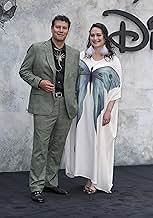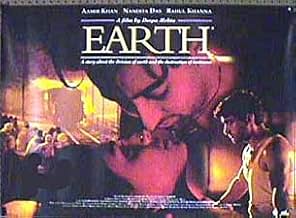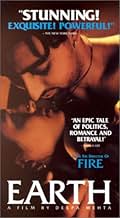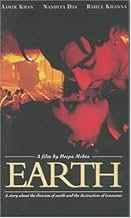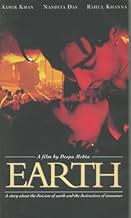यह 1947 की बात है और भारत और पाकिस्तान के बीच सीमा रेखा तैयार की जा रही है. एक युवा लड़की त्रासदी का गवाह बनती है क्योंकि उसकी आया (नैनी) दो पुरुषों के प्यार और राजनीतिक और धार्मिक हिंसा की ... सभी पढ़ेंयह 1947 की बात है और भारत और पाकिस्तान के बीच सीमा रेखा तैयार की जा रही है. एक युवा लड़की त्रासदी का गवाह बनती है क्योंकि उसकी आया (नैनी) दो पुरुषों के प्यार और राजनीतिक और धार्मिक हिंसा की बढ़ती समस्या के बीच फंस गई है.यह 1947 की बात है और भारत और पाकिस्तान के बीच सीमा रेखा तैयार की जा रही है. एक युवा लड़की त्रासदी का गवाह बनती है क्योंकि उसकी आया (नैनी) दो पुरुषों के प्यार और राजनीतिक और धार्मिक हिंसा की बढ़ती समस्या के बीच फंस गई है.
- पुरस्कार
- 3 जीत और कुल 2 नामांकन
- Hariya
- (as Raghuvir Yadav)
- …
- Butcher
- (as Pavan Malhotra)
फ़ीचर्ड समीक्षाएं
The film, based on the autobiographical novel "Cracking India" by Bapsi Sidhwa, concentrates on the effect the civil turmoil has on personal relationships. Somehow, politics brings out the worst in everyone; submerged resentments and trivial jealousies fuel shocking atrocities. Even innocent little Lenny manages to act badly, despite her "neutral" status.
Despite the presence of at least one "Bollywood" star (Aamir Khan) the director, Deepa Mehta, has not made a crowd-pleaser here. There are survivors, but no surviving heroes. The story unfolds first at a leisurely pace, gaining speed as independence day approaches and ends in a montage of mobs, destruction and violence. Every scene is beautifully composed and almost every part sensitively played. Maia Sethna as Lenny, Nandita Das as her beautiful young nanny Shasta , Rahul Khanna as Hasan, Shastas' lover and Aamir Khan as Dil Navaz the 'ice candy man" are all stand-outs. While not actually filmed in Lahore (the authorities there were not keen, it seems) the film evokes superbly a hot, ancient and troubled land. The whole style of the film is quite different from anything to emerge out of Hollywood and that alone makes it worth seeing.
It is suggested in the film that perhaps the villain here was that old standby, human nature. It does seem, though, that the British India administration (represented here only by one drunken official at a dinner party) and particularly the British government, had a lot to answer for. The twenty-five years or so leading up to independence were marked by the failure of successive conservative British governments to allow a truly responsible democracy to emerge in India when it was quite clear by the end of World War One that independence was inevitable. (The white Dominions on the other hand were practically pushed into independence.) Then, when the post-war Labour government decided to grant independence it did so with unseemly and disastrous haste. No, the chief villain was perfidious Albion, or rather British "muddling through". Here we get a beautiful, moving, elegiac account of the victims of bad colonial policy driven by racism and unenlightened self-interest.
If the film is conventional is outline, it is also intelligent, beautiful and economical in a way most stodgy historical epics are not. Its predominantly Western structure is filtered through with a restrained Bollywood sensuality, and, in the first half especially, after one has gotten used to the rather stilted dialogue and stylised situations, one is astounded by the caressing fluidity of the camerawork; the uncommon beauty of compositions, especially indoors, where the essentially muted 'earth' colours of the decor are pierced by unearthly shards of light; the profusion of dazzling colours, in costumes, and especially in the horrific marriage sequence, undermining the strained sobriety of most historical epics; the unforced breaks into song and dance, the accumulation of vignettes, some comic, some full of joy and promise, some bursting with foreboding, that give a sense of life being lived, a life already fragile in status, waiting to be destroyed; the unabashed use of melodrama, its critical framing device (in one horrible scene, the protagonists watch helplessly from a balcony the strangely beautiful conflict, passive like us the audience), and its emotional demands on the audience I realise that much of my pleasure comes from a racist 'Orientalism', a projection of my desires of exoticism and Otherness on the East, but my own country has a traumatic history of British Imperialism and partitions, so I don't feel too guilty.
The first half is as good as anything in cinema this year, once one has got used to the shifts in register. It is full of the autumnal sadness of a Chekhov play, or Ray's CHARULATA, or LE REGLE DU JEU, where we observe people living life, being friends, making love playing games, while we know history is sadistically poised on the brink, waiting to crush everything. Mehta never falls into nostalgia for this doomed idyll - she records the legacy of the British Empire; the horrors of the caste system; the emotional repression, the arranged marriages between senile paedophiles and pre-pubescent girls. But this section is also full of epiphany, the thrill of the sexual chase, friendship, poetry and, above all, comedy, all the things about to be distorted and destroyed by history as it performs a body snatching operation onto people we have come to love and turns them into vicious murderers.
The second half is an unrelenting catalogue of jolting spasms of violence. Day gives way to night, earthy browns and sun to blackness, friendship and love to death and hate. The film is also a bildungsroman, the tale of the development of a young girl as she learns about life, love, family, gender, language, society, history, culture, politics a development cruelly cut short, distorted, vandalised - when we see the charming dew-eyed narrator half a century later, emotionally in ruins as she stands self-effacingly in the ruins of Imperial pomp (an amazing shot, the film's sparing use of ruined architecture gives the film on occasion a ghostly feel), we sense irreperable loss.
Most of the comments here on IMDb are positive and I agree with these reviews. However, for me the cynicism of the critics was unfounded because I was not expecting the usual Hollywood movie. If you cannot relate to this film in a positive way then I suppose that you have not traveled much and have not lived in other cultures, at least not in Asia. This is not an American film made for an American audience.
This is very much an adult film for a sensitive and mature audience. It is certainly not for those seeking the usual thrills and spills and formula love stories. We are given a look at a very important and prominent country being split up by a colonial power, and how this political decision affects millions of people in some of the most awful manners. A million lost their lives! The tension between India and Pakistan still haunts us all ! So don't expect a nice and sweet film, although there were some beautiful scenes of childhood innocence and the romance of young lovers.
The symbolism is rich. At the start we see a dinner table with the main groups of people represented in the formation of Pakistan: English, Sikh, Muslim, Hindu, Parsee. Throughout the film Lenny Baby represents the innocence and naivety which so many people remain in during geopolitical processes. When it is this young girl's birthday, she can find no one who cares. Her birthday is the same day of the Pakistan-India split, and the symbolism is obvious. She then finds a Muslim refugee boy whose mother was brutally killed by Hindus. He asks her if she is a Hindu and when she replies "no" she also asks if he wants some cake. "Cake? What is cake?" Lenny-the-Naive is baffled, and again the symbolism is obvious. So many of us cannot really relate to the plight of refugees. What happens to this innocent and naive position at the end? We are stunned to see the results. Naivety leads Beauty and Love to a terrible fate. Innocence is tragically deceived. It wasn't until my second viewing of this film that I saw the many symbolic references. Watch the film with this perspective and you will see through the cynicism such as writer "Pass the pappadom" makes elsewhere on this page.
One symbolic reference that I am not sure if I understand was that of the Sikh man and his family, hiding from the Muslim killer mob. He was such a sincere and gentle man, and even his dagger raised in defense did not detract from his positive qualities. Was he portrayed in this way because the Sikhs had too much 'bad press' about their warrior ways? Were the Sikhs ineffective in protecting themselves during the division?
A friend of mine told me that he cried all the way home after seeing this film. He is 46 years old and not a weak and overly sensitive person. My wife and I were quite emotionally moved by this film, and we cannot relate to the film critics that say otherwise. By the way, my wife lived in India for a year and she loved seeing the various scenes of everyday Indian life, so you may enjoy the film just for the sake of seeing people living life outside of Hollywood America.
One last symbolic reference to ponder was the touching romantic scene between the two lovers amidst the ancient ruins. Here we see a Muslim man saying that he would convert to Hinduism so that the marriage would be possible. All they needed to do is to leave to live in the newly divided India. The ancient ruins indicate the past, but unfortunately the lovers return to the present.
This is a film that I will remember for a long time. I highly recommend that you see it, if you don't mind a serious film about major issues, seen from a non-American perspective.
Director - writer Deepa Mehta deserves much credit for depicting the complexities of one of the world's worst tragedies with diplomatic balance, not placing blame on any one group but yet revealing the errors and brutality that each group made.
The score by A.R. Rahman is a powerful blend of Indian and western film music, lightening the joyous moments (such as the kite-flying scene) and deepening the foreboding in other scenes (such as the train of death).
क्या आपको पता है
- ट्रिवियाAamir Khan's first negative role. He went on to receive much critical acclaim for his performance.
- भाव
Older Lenny: I was eight years old, living in Lahore in March of 1947, when the British Empire in lndia started to collapse. Along with talks of lndia's independence from Britain came rumblings about its division into two countries, Pakistan and lndia. Hindus, Muslims, and Sikhs who had lived together as one entity for centuries. suddenly started to clamor for pieces of lndia for themselves. The arbitrary line of division the British would draw to carve up lndia in August of 1947 would scar the Subcontinent forever.
- कनेक्शनFeatured in Women Make Film: A New Road Movie Through Cinema (2018)
टॉप पसंद
- How long is Earth?Alexa द्वारा संचालित
विवरण
बॉक्स ऑफ़िस
- US और कनाडा में सकल
- $4,24,798
- US और कनाडा में पहले सप्ताह में कुल कमाई
- $42,449
- 12 सित॰ 1999
- दुनिया भर में सकल
- $4,24,798


